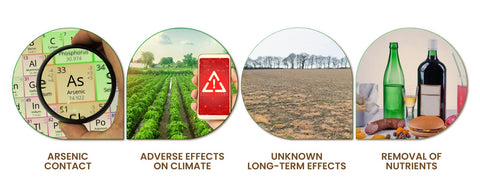
Disadvantages of Not Eating or Drinking Organic Products
The term “organic” refers to the things that are natural or are related to nature. Therefore, it is instinctive that organic foods are foods grown/processed without the use of any sort of synthetic chemicals, hormones, antibiotics, and genetically modified organisms (GMOs). If a food is labeled as organic, it means that it is free from any artificial food additives (including sweetener, preservative, coloring, flavourning, and MSGs. Products such as organic moringa powder, organic oats, and amla juice, available on various online and offline stores such as nutriorg.com, are made from the use of crops grown with the help of natural fertilizers such as manure to boost plant growth. Such products help in promoting ecological balance and conservation of biodiversity.
The organic food market as of the late 20th century has grown to the level of a multibillion-dollar industry and is continuously growing, having its own standards of production and processing, with distinct distribution chains. Some major disadvantages of not eating or drinking organic products are as follows:
-
Safety: In order to fulfill demands and provide delicious food to more people with ease, the use of chemicals has been increased in the food industry-leading its users to diseases such as Heart Problems, Obesity, Cancer, High Blood Pressure, and Diabetes. The use of organic foods can easily avoid such problems. Hence, removing such items from one’s diet can allow one’s body to have an opportunity to even heal from past effects and have no safety contingencies. It has also been mentioned by a few people who use organic oats that they feel comparatively more energetic than what they used to feel by eating breakfast with artificial flavorings. There have been many cases where batches of non-organic foods were affected, and traces of E. Coli were discovered, which is found in feces.
- Taste: Inorganic foods have additives that can alter the taste and nutritional value of the food, contributing to fat gain mainly used for extending the shelf life of the food. Therefore, destroying the natural feel of the food. These artificial sweeteners, preservatives, colorings, and flavorings also have adverse effects on fuller flavor profiles of food that people experience. It is also noticed that the continuous use of non-organic products slowly affects the taste buds; such effects can be healed by using organic products such as amla juice, organic moringa powder, organic oats, etc., available at many online and offline stores.
- Pricey to nature: Even though inorganic products are economical in price, they can still be a little too pricey for the environment. As a result, non-organic food has started becoming less popular due to its glaring use of pesticides and insecticides; when introduced to the soil, it destroys its nitrogen content which is very important for the fertility of the soil. These chemicals used in non-organic food can further carry over to these crops and cause gastrointestinal issues. In the case of organic farming, the fertilizers used are all natural substances that help maintain the long term fertility of the soil.
- Threat to Infants: A Cord Blood Test Result showed that there are traces of more than 200 harmful chemicals and 21 pesticides in the cord blood of a newborn baby; therefore, we can assume that such conventional food practices are closely associated with birth defects, autism, ADHD, learning disorders, leukemia, and nervous system disorders in infants. In the case of organic food products which are free from any chemicals or pesticides, they can rather be a very positive source of nutrition for infants.

- Arsenic Contact: Non-organic chemicals can wreak havoc in the human body due to their contact with arsenic mixed in underground water as arsenic is a semi-metallic chemical that has ties with carcinogenic elements, its intake can cause arsenic poisoning can give rise to major health issues and death if not treated on time. In comparison, there is no arsenic contact in the case of organically grown and produced food products, making them safe.
- Adverse Effect on Climate: Pesticides used in non-organic products have a great impact on climate change throughout the process of manufacturing, transportation, and application as at the time of making the pesticides, three greenhouse gasses are emitted as a result which are carbon dioxide, nitrous oxide, and methane, Phosphate mining is also an important part of making weed killers which cause destruction of air, water, and wildlife habitat.
- Unknown long-term effects: Many synthetic substances found in non-organic food products have not been studied for long-term effects, and therefore its safety over the long run is still unconfirmed. Also, there is some evidence proving that the synthetic substances used to produce non-organic food products cause long-term damage to land, ultimately making it infertile., Organic food has been used for a very long time, and to date, no major long-term effects have been reported/tested.
- Removal of Nutrients: While processing and mixing with various artificial sweeteners and preservatives does make non-organic food last a little longer, it can also be very detrimental by affecting the nutrition of the food. Organic fruits and vegetables are comparatively more nutritious and wholesome than inorganic food. Organic foods contain more minerals, vitamins, enzymes, and micronutrients compared to commercially grown products as the soil is nourished with sustainable farming practices. On average, organically grown products provide comparatively 21% more iron, 27% more vitamin C, 29% more magnesium, and 13% more phosphorus than fruits and vegetables grown conventionally.

Agriculture is a very critical part of the economy. The increase in the use of non-organic farming and consumption has made a huge disturbance in the harmony which exists between plants, soil, animals, and human health. The substantial use of antibiotics and chemicals in non-organic food manufacturing technology has forced health-conscious people to use and promote organic farming. Moreover, findings reveal that the food made using organic methods taste considerably better and have a wider balance of minerals and vitamins than non-organic food products. It has also been found that eating natural food reduces heart attacks, cancer, strokes, and many other diseases by a considerable amount.
Being pocket-friendly, easily available, and long lasting is surely good, but is it really that good when it comes to its overall effect? As discussed above, the disadvantages of inorganic products can weigh a lot more when compared to its advantages as it doesn’t only destroy the nutrients, gives adverse effects on climate and has arsenic contact, but also it is harmful to you and nature itself. Hence, it is pretty clear that one should seriously try to promote the use of organic products in their life and in the lives of others as much as possible for a better today and an even better tomorrow.
